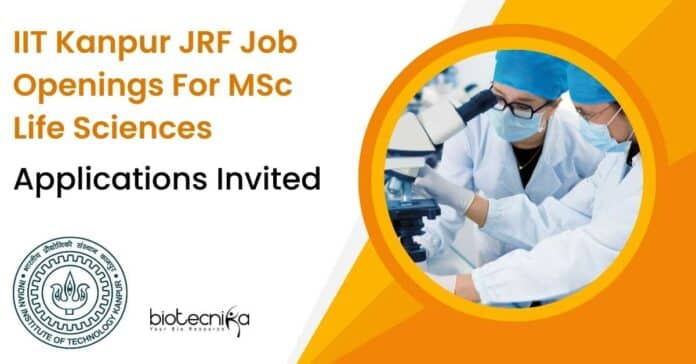IIT Kanpur JRF Jobs Available For MSc Life Sciences – Applications Invited
IIT Kanpur JRF Jobs Available For MSc Life Sciences – Applications Invited. IIT Kanpur Junior Research Fellow Vacancies. MSc Life Sciences JRF Jobs. Interested and eligible applicants can check out all of the details on the same below
This job expires in
Advertisement Number: P.Rect./R&D/2023/158
Department of Biological Sciences & Bioengineering
Applications are invited from suitable candidates for two temporary positions of JRF (Junior Research Fellow) in a DBT Welcome Trust India Alliance sponsored project at the Department of Biological Sciences and Bioengineering, IIT Kanpur.
Position: Junior Research Fellow (02)
Note: The position is purely temporary, initially for one year, and it can be extended further based on performance till the duration of the project.
Application procedure: Interested candidates should send their brief CV by email to the following email address: [email protected].
IMPORTANT: Hard copy of the application or any degree certificate is NOT required at this stage.
Last date: July 31st 2023
Interview and selection:
- Interview of selected candidates will be carried out online.
- No TA/DA will be paid for the attending the interview.
- Applicants who do not meet the minimum eligibility criteria and desirable work experience will not be called for the interview.
Dr. Arun K Shukla
Department of Biological Sciences & Bioengineering
Indian Institute of Technology Kanpur
Kanpur – 208016 India.
Minimum Qualification: M.Sc. in Life Sciences
Desirable Qualification: CSIR-NET/GATE/DBT-JRF
Desirable work experience: Prior experience in molecular biology techniques, expression and purification of proteins, cellular signaling are required. In addition, hands-on experience with membrane protein expression and purification are preferred.
Salary Range: INR 31000/- per month
Click here for the notification
Possible interview Questions that may be asked for JRF Position at IIT Kanpur
- Can you explain your research experience and how it relates to the project you have applied for? Answer: In my previous research experience, I focused on investigating the role of genetic factors in disease susceptibility. I conducted experiments involving DNA extraction, PCR amplification, and genetic analysis techniques. My work involved analyzing genetic data and correlating it with clinical outcomes. The skills and knowledge I gained from this research experience directly align with the objectives of the project I have applied for, which aims to explore the genetic basis of a specific disease.
- What motivated you to pursue a career in research, and why are you interested in this specific field? Answer: I have always been fascinated by the power of scientific research to unravel mysteries and contribute to advancements in various fields. I was particularly drawn to this specific field due to its potential impact on human health and the opportunity to make a difference in understanding and treating diseases. The prospect of contributing to meaningful research projects, expanding scientific knowledge, and improving patient outcomes fuels my passion for a research career.
- How do you approach experimental design and data analysis in your research work? Answer: When designing experiments, I begin by clearly defining the research objectives and identifying the most suitable methods and techniques. I pay close attention to the control groups, sample sizes, and variables to ensure robust and reliable results. During data analysis, I employ statistical tools and software to draw meaningful conclusions. I validate and cross-reference my findings with existing literature and collaborate with team members or supervisors to gain insights and ensure accuracy in interpretation.
- Can you describe a challenging situation you encountered during your research work and how you overcame it? Answer: During a research project, we encountered an unexpected issue with sample contamination that threatened the integrity of our data. To resolve this challenge, I immediately communicated the issue to my supervisor and team members. We swiftly implemented strict protocols for sample handling, including enhanced sterile techniques and frequent monitoring. By taking proactive measures, closely monitoring the results, and repeating experiments, we were able to overcome the contamination issue and obtain reliable data for analysis.
- How do you stay updated with the latest developments and advancements in your research field? Answer: Staying updated with the latest developments is crucial for any researcher. I regularly read scientific journals, attend conferences, and participate in webinars to keep abreast of recent findings and emerging trends. I engage in discussions with colleagues and researchers in my field, sharing insights and exchanging knowledge. I also make use of online platforms and professional networks to access preprint articles and collaborate with experts. Continuous learning and staying informed about the latest research are key aspects of my approach.
Editor’s Note: IIT Kanpur JRF Jobs Available For MSc Life Sciences – Applications Invited. Please ensure you are subscribed to the Biotecnika Times Newsletter and our YouTube channel to be notified of the latest industry news. Follow us on social media like Twitter, Telegram, Facebook






























